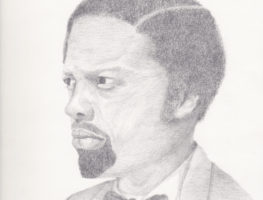“But God wants me to be happy, right?”
As a pastor living in North America in the 21st century, I have been asked this question more than once. Christians conditioned by a me-first (and “me-always”) culture default to this one abiding principle: the universe exists so I may indeed be happy. I am not opposed to happiness per se. It is a product of the work of the Holy Spirit. Happiness, or “joy” if you prefer, is both in Jesus and connected to the mission of Jesus. He said, “I have told you these things so that you will be filled with my joy. Yes, your joy will overflow!” (John 15:11 NLT). The issue is not whether or not God wants us to be happy, content, joyful people; the issue is how do we define happiness and more importantly, where do we find this happiness?
The trans-cultural pursuit of what we may call “happiness” is really “wholeness,” becoming complete human beings. [Tweet This]
We were each created in the image of God, but as a master artist, God has created us uniquely in his image. We are to reflect God’s image into the world and echo back the praise of creation to God, but the ways in which we reflect God’s image will be based on how God has uniquely formed us and how he is re-forming us to be a unique expression of the image of Jesus. This transformation and wholeness allows us to be our true selves and enables us to overcome the internal obstacles to experiencing the happiness we all so desperately long for. Along this track of genuine, Jesus-formed, character transformation the church carries forward the mission of Jesus. Where we get off track is when we exchange the process of spiritual transformation for the acceptance of radical authenticity.
The mission of Jesus is to redeem and restore God’s good world including humanity, God’s image-bearing creation. God created us to be whole, body and soul, so our true selves could emerge from the rubble of our false selves bent out of shape from the forces of corruption running rampant in God’s world. Radical authenticity is the mistaken task of being true to your self, determining what seems natural to you, and rejecting all outside influences, conventions, and moral knowledge. Being “true to yourself” enthones the false self and follows the royal decrees of this self calling it “spontaneity,” “freedom,” and “being who I am.”
N.T. Wright in After You Believe describes radical authenticity as the self-talk that goes like this:
Be yourself; don’t let anyone else dictate to you; don’t let other people’s systems or phobias cramp your style; be honest about what you’re really feeling and desiring. Get in touch with the bits of yourself you’ve been screening out; make friends with them and be true to them. Anything else will result in a diminishing of your true, unique, wonderful self.
Wright adds:
Some people mistake (this way of thinking) for the gospel itself.
Radical authenticity follows Shakespeare’s axiom: “To thine own self be true,” to which I reply, “Yeah, but what if you are jerk?” This kind of authenticity misunderstands the gospel and sadly misdirects the mission of the church. The gospel does not invite us to look outside to the rules or inside to our authentic selves. The gospel invites us to look to Jesus. We do not find our true selves, our uniquely-created-in-the-image-of-God selves, by looking inward at the false self, but by looking upward to Jesus. In speaking to the crowds following him, Jesus said: “Anyone who intends to come with me has to let me lead. You’re not in the driver’s seat; I am. Don’t run from suffering; embrace it. Follow me and I’ll show you how. Self-help is no help at all. Self-sacrifice is the way, my way, to saving yourself, your true self. What good would it do to get everything you want and lose you, the real you? What could you ever trade your soul for?” (Mark 8:34-37 The Message). Jesus wants us to discover our true selves, but it is found in first dethroning the false self with all of it’s wants, wishes, and desires and doing what may in fact be the most unnatural act of all: allowing that self to be crucified and buried, so God can resurrect the true self in a slow methodical process of spiritual transformation.
Never has this course correction from radical authenticity to spiritual transformation been more urgent than in light of the current cultural discussion regarding sexuality, sexual identity, and sexual ethics. The church has failed in the past when we make conversations regarding sexuality merely a matter following a list of rules: Do this and don’t do that…or do this and try not to do that…or do this and if you do that, don’t tell anybody…or do this and if you do that, confess it privately and try not to do it again. Our sexuality is too complex, too connected to our internal life, to merely manage it by a list of rules. Plus spiritual transformation, as an integral part of the mission of the church, has never been a process of following the rules.
When it comes to sexuality, radical authenticity has condition people falsely to assume that they must be free to express sexual desires according to the norms established by the false self. They reason: I have these desires. I have this sort of sexual orientation. I would be inauthentic and untrue to myself if I do not seek to fulfill these desires. Within this context, Christians across the spectrum of sexual orientation not only live out of their false self, but worse yet, they assume their identities, their true selves, are primarily tied to their sexuality. We have allowed the worship of Aphrodite to misshape us into people who define ourselves first and foremost by our sexual identity. We should certainly not ignore our sexuality, but we must tear down the altar to Aphrodite and submit our sexaulity to a process of spiritual transformation where we can find our true selves with a much more modest view of our sexual identity.
Spiritual transformation is not looking at the false self as the unblemished picture of who we are supposed to be. Spiritual transformation is the work of the Spirit to conform us into the image of Jesus for the joy of God the Father. We can be happy, joyful people. We can discover our true selves, but we cannot find out who we are supposed to be if we start with the false self. We have to place ourselves, all of ourselves including our sexuality, in the hands of the Holy Spirit and allow him to form us, mold us, change us, to reflect the image of Jesus. This work of transformation not only brings us the happiness we are looking for, but it ultimately brings joy to the heart of God our Father, because the Father loves the Son. As the Father sees the image of the Son being formed in our hearts and lives he exclaims once again: “Behold my son! The one that I love!”
Dedicating ourselves to radical transformation as a direct rejection of radical authenticity is the only way forward if we are preserve the mission of the church.
— [Image by andronicusmax, CC via Flickr]











Missio Alliance Comment Policy
The Missio Alliance Writing Collectives exist as a ministry of writing to resource theological practitioners for mission. From our Leading Voices to our regular Writing Team and those invited to publish with us as Community Voices, we are creating a space for thoughtful engagement of critical issues and questions facing the North American Church in God’s mission. This sort of thoughtful engagement is something that we seek to engender not only in our publishing, but in conversations that unfold as a result in the comment section of our articles.
Unfortunately, because of the relational distance introduced by online communication, “thoughtful engagement” and “comment sections” seldom go hand in hand. At the same time, censorship of comments by those who disagree with points made by authors, whose anger or limited perspective taints their words, or who simply feel the need to express their own opinion on a topic without any meaningful engagement with the article or comment in question can mask an important window into the true state of Christian discourse. As such, Missio Alliance sets forth the following suggestions for those who wish to engage in conversation around our writing:
1. Seek to understand the author’s intent.
If you disagree with something the an author said, consider framing your response as, “I hear you as saying _________. Am I understanding you correctly? If so, here’s why I disagree. _____________.
2. Seek to make your own voice heard.
We deeply desire and value the voice and perspective of our readers. However you may react to an article we publish or a fellow commenter, we encourage you to set forth that reaction is the most constructive way possible. Use your voice and perspective to move conversation forward rather than shut it down.
3. Share your story.
One of our favorite tenants is that “an enemy is someone whose story we haven’t heard.” Very often disagreements and rants are the result of people talking past rather than to one another. Everyone’s perspective is intimately bound up with their own stories – their contexts and experiences. We encourage you to couch your comments in whatever aspect of your own story might help others understand where you are coming from.
In view of those suggestions for shaping conversation on our site and in an effort to curate a hospitable space of open conversation, Missio Alliance may delete comments and/or ban users who show no regard for constructive engagement, especially those whose comments are easily construed as trolling, threatening, or abusive.